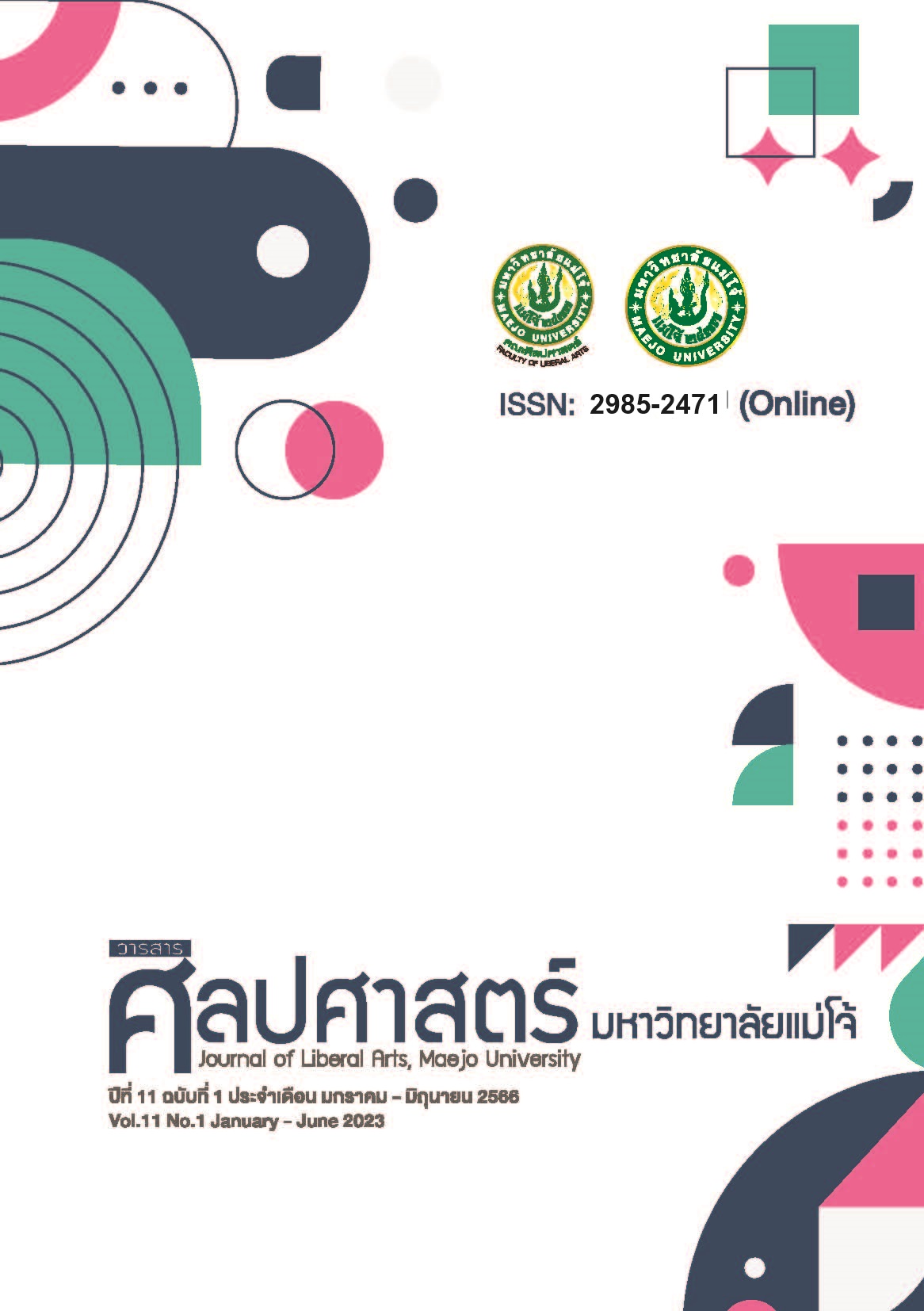A study of Mission and Role in Chinese Research of the Confucius Institute in Thailand
Main Article Content
Abstract
This paper aims to 1) study the problems in Chinese language research of Chinese teachers, 2) survey the demand in establishing a research center that will facilitate Chinese language teaching personnel, 3) initiate a guideline for the Confucius Institute's Chinese research cooperation with Thai educational institutions in the future using a combined research method. The sample groups were from 27 Confucius Institutes and Confucius Classrooms in Thailand. There were 106 participants giving their evaluation on the key performance of current Confucius Institutes and their opinion on forthcoming Chinese research support.
The results showed that the most special and outstanding of the missions and roles in Thailand is HSK Test Center with an average (Mean = 8.46). The development of Confucius Institutes in Thailand had three main phases are the first phase (2006-2011), the second phase (2012-2016), the third phase (2017-present). The top three obstacles for conducting Chinese research were 1) the lack of experts in Chinese research (53.3%), 2) the lack of financial support (45.7%), 3) non-existence of research advisory center (32.4%). Accordingly, the top three reasons or demands for teachers’ decision to conduct Chinese research were 1) the instructive experts (71.4 %), 2) research budget (68.6%), 3) the database to Chinese research resources (46.7%). Guidelines for future cooperation under the support of the Confucius Institute by establishing a Chinese Research Support Center in Thailand It has 3 main roles: 1) as a source of research funding; 2) Resource Center Chinese research and information database 3) As a center for Chinese experts to provide Chinese research consulting which will benefit teachers Thai teacher in line with the national education strategy is an upgrade of the role mission and reflect the value of the establishment of the Confucius Institute in Thailand to the world stage.
Article Details

This work is licensed under a Creative Commons Attribution-NonCommercial-NoDerivatives 4.0 International License.
ต้นฉบับที่ได้รับการตีพิมพ์ในวารสารคณะศิลปศาสตร์ มหาวิทยาลัยแม่โจ้ ถือเป็นกรรมสิทธิ์ของมหาวิทยาลัยแม่โจ้ ห้ามนำข้อความทั้งหมดหรือบางส่วนไปพิมพ์ซ้ำ เว้นเสียแต่จะได้รับอนุญาตจากมหาวิทยาลัยฯ เป็นลายลักษณ์อักษรReferences
กาญจนา สกุลเพชรอร่าม, ชลธี เสมอเชื้อ. (2564). การศึกษาและวิเคราะห์นโยบายเส้นทางสายไหมทางทะเลศตวรรษที่ 21ในมิติการเผยแพร่วัฒนธรรมผ่านสถาบันขงจื่อเส้นทางสายไหมทางทะเล : ประเทศไทย. วารสารวิชาการ คณะมนุษยศาสตร์และ
สังคมศาสตร์ มหาวิทยาลัยราชภัฏพระนคร. 5(1), 16.
จุฬาลักษณ์ ชอบงาม, สรรพสิริ ส่งสุขรุจิโรจน์ และเนตรน้ำทิพย์ บุดดาวงศ์. (2563). การสำรวจงานวิจัยด้านจีนศึกษาที่ได้รับการตีพิมพ์ในวารสารที่ผ่านการรับรองคุณภาพจาก TCI สาขามนุษยศาสตร์และสังคมศาสตร์ในรอบทศวรรษ (พ.ศ.2552–2561). วารสารมนุษยศาสตร์และสังคมศาสตร์ มหาวิทยาลัยราชภัฏอุบลราชธานี
(2), 151-163.
นริศ วศินานนท์. (2561). การศึกษาสภาพการจัดการเรียนการสอนภาษาจีนในระดับอุดมศึกษาในประเทศไทย. วารสารจีนศึกษา มหาวิทยาลัยเกษตรศาสตร์. 9(2), 263-287.
สำนักงานเลขาธิการการศึกษา. (2564). สืบค้น 29 สิงหาคม 2564,จากhttp://www.onec.go.th/index.php/book/BookView/1540
สำนักความสัมพันธ์ต่างประเทศ สำนักงานปลัดกระทรวงศึกษาธิการ. (2564). ศูนย์แลกเปลี่ยนและส่งเสริมความร่วมมือด้านภาษาจีนระหว่างประเทศ สืบค้น 29 ธันวาคม 2564, จากhttps://www.bic.moe.go.th/index.php/2021-08-19-21-30-45/2465
สำนักงานเลขาธิการสภาการศึกษา. (2563). ยุทธศาสตร์ชาติ. สืบค้น 14 มิถุนายน 2564 ,จาก http://www.onec.go.th/th.php/page/category/CAT0001078
อักษรศรี พานิชสาส์นและคณะ. (2554). โครงการพัฒนายุทธศาสตร์กำลังคนและงานวิจัยเพื่อรองรับกระแสจีนภิวัตน์.สถาบันระหว่างประเทศเพื่อการค้าและการพัฒนา (องค์การมหาชน).
Chiangmai University. (2012). The Chinese volunteer teacher. Retrieved July 18, 2021, from http://archive.lib.cmu.ac.th/full/T/2555/regio40755sb_ch1.pdf
Cochran, W.G. (1963). Sampling Technique. 2nd Ed., New York: John Wiley and Sons.
Da H.J. (2020). Research on the development of Confucius Institute in Thailand. Journal of Chinese Language and Culture. 7(1), 19-32.
Ding, X.L. (2014). China’s Soft Power in Asia: Projection and Profile. Beijing: The Oriental Press.
Hanban. (n.d.). (2020). About Confucuis Institutes/Classrooms, Hanban. Retrived December 18, 2021. from: http://hanban.org/confucuisinstitute/node_10961.html
Kasetsart University. (2013). The Chinese volunteer teacher. Retrieved September 10, 2021. from http://www.intaff.ku.ac.th/Admin/WBfund/data/pdffiles/mua/mua56_10.pdf
Khon Kaen University. (2017). Action Plan. Retrieved June 28, 2021, from https://plan.kku.ac.th/pln2013/files/Reportkku2562_Eng.pdf
Man, S.& Phenmanee, K. N. (2018). Roles and Responsibilities of the Confucius Institute in Implementing Cultural Diplomacy Policies in Thailand: A Case Study of the Confucius Institute, Khon Kaen University and Mahasarakham University. Chinese Studies Journal Kasetsart University. 11(1), 175-214.
Ritsumei Confucius. (2021). Confucuis activities project. Retrived November, 28, 2021. from: http://ritsumei.ac.jp/confucius/activities/project_c/
Tangyuenyong, P.; Choonharuangdej, S. (2010). Research on the Teaching and
Learning of the Chinese Language in Higher Education Institutions in
Thailand: A Summary. Thai World Affairs Center. Retrieved November, 4,
from http://www.thaiworld.org/upload/question/file_830.pdf,
Trisanawadee, S. (2020). Chinese Cultural Diplomacy towards ASEAN Countries:
Case Study of Confucius Institutes in Thailand. Manutsayasat Wichakan,
(2), 416-450.
Thong-art, C. (2018). Management of Thai language learning by using competency in the 21st century: theory to practice. education jouEducationalongkorn University, 46(1), 171-184.
UNESCO. (2006). Annual report 2006: UNESCO Institute for Lifelong Learning. Retrieved from https://uil.unesco.org/annual-report-2006-unesco-institutelifelong-learning
UNESCO. (2014). Global citizenship education: Preparing learners for the challenges of the 21st Century. Retrieved from, http://unesdoc.unesco.org/images/0022/002277/227729e.pdf
Volodzko, D. (2015). China’s Confucius Institutes and the Soft War. The Diplomat. Retrieved December, 12, 2021, from: http://thediplomat.com/2015/07/ chinas-confucius-institutes-and-the-soft-war.
Wang, Y.J. (2019). Confucius Institutes in Thailand: Revealing the Multi-dimensionality of China’s Public Diplomacy. Waseda University Journal of The Graduate School of Asia-Pacific Studies, 37(3), 99-113.
Guo, X. H. (2018). Public Management for Educational Cooperation Between Thai Government and People Republic of China. Journal of Rangsit Graduate102 Studies in Business and Social Sciences. 4(2), 283-296.

